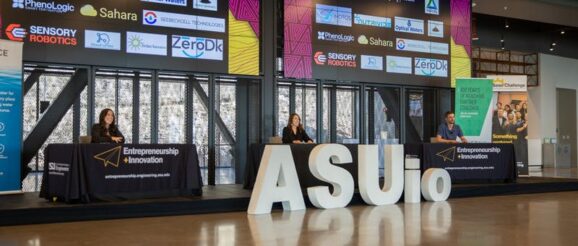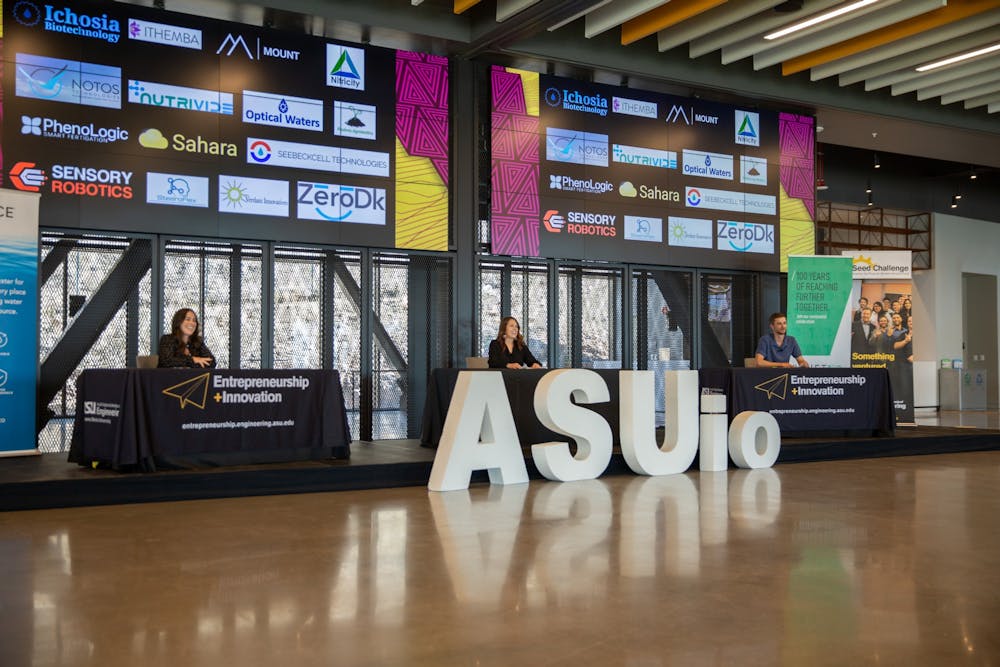Student entrepreneurs win over $300,000 in ASU Innovation Open – The State Press

A scene from The ASU Innovation Open finals is shown at the Sun Devil Football Stadium on Friday, Feb. 5, 2021. Entrepreneurs entered startup company pitches for a chance to win some of the $300,000 in prizes.
Seven entrepreneurial teams from different universities took home over $300,000 in prizes at the fifth annual ASU Innovation Open on Feb. 5.
The Innovation Open is a competition that allows college entrepreneurial teams to pitch their hardware business enterprises to judges in exchange for feedback, mentorship and cash and services.
The competition offers funding and mentorship to student competitors who are launching hardware enterprises in an array of industries. Teams came from universities across multiple countries.
The event was sponsored by many organizations including ASU’s Ira A. Fulton Schools of Engineering, Avnet and Breakthrough Energy Ventures.
One team, blip energy from Northwestern University, won the $100,000 Climate Change prize sponsored by Breakthrough Energy Ventures. The team’s first product is a smart battery that plugs in to a standard wall outlet and collects and stores energy to be used at a later time.
“That’s enough to run an air conditioner for two hours, run a fridge for 24 hours, run a WiFi router for weeks,” said Sophia Wennstedt, co-founder of blip energy.
The device is designed to save money for renters and homeowners that have variable-rate electricity plans.
“If you’re on a variable-rate plan, it’ll charge when the price of energy is cheap and it will use that stored power to run anything that’s plugged into it when the real-time cost of electricity is expensive,” Wennstedt said.
ASU-led team Optical Waters LLC won the $25,000 Technology for Social Equity prize sponsored by SOURCE Global PBC. The company is designing optical fibers that emit ultraviolet light to disinfect the inside of hard-to-reach spaces like pipes.
Congrats to #ASUVentureDevils Optical Waters on today’s award! #ASUio https://t.co/kWweN7TSLm
— Edson Entrepreneurship + Innovation Institute (@EntrepreneurASU)
“Ultraviolet radiation is known for being able to kill bacteria and pathogens, but it’s nearly impossible to deliver the UV light into tight channels,” said Mariana Lopes, co-founder of the company who recently earned her Ph.D. at ASU. “It’s the first technology that can actually deliver UVC radiation to inside of tight channels.”
Lopes said nanoparticles are added to the side of the fiber that cause the light traveling through them to scatter outward.
Lopes said that chlorination is currently used to prevent bacteria from growing inside of pipes and other tight channels.
“In the future, the goal is that instead of chlorination, we can just put these UVC-light-emitting fibers all over our pipes and that can be a residual disinfectant,” Lopes said.
Lopes said the technology could be used in household and medical products like refrigerator pipes, coffee makers and catheters.
“Hopefully we can integrate them into every tight channel that has water passing through it,” Lopes said.
The company hopes to see their first working prototype and first sales in the next three months, Lopes said.
“You get to actually get various rounds of feedback from the judges to make your pitch better,” Lopes said. “It helps with your pitch, it helps with your business, but it just helps you in terms of critically thinking about how to sell anything or how to add value to anything you’re doing.”
Another team, Floe from Yale University, won a $100,000 prize sponsored by Avnet.
“We’re developing a smart, cost-effective and environmentally friendly solution to tackle ice dams or ice buildup on roofs,” said David Dellal, one of the founders of Floe. “It’s an $11.1 billion market in the United States, and it really causes some significant damage nationwide and there’s really no good solution on the market right now to solve it.”
Dellal said the idea started as a class project when he was a senior at the Massachusetts Institute of Technology.
“After the class ended, I kind of just ran with it and started the company,” Dellal said.
Dellal said the company is aiming for 40% cost savings and 99% energy savings compared to existing solutions on the market.
“This winter, we’re currently running this major pilot around the country with around 50 units with major customers,” Dellal said. “Following this winter, we’re doing some accelerated life testing to make sure this can stay on the roof year-round for 5 to 10 years.”
Dellal said ASU did a great job of running the competition.
“People have struggled with how to deal with COVID and trying to keep the same type of enthusiasm,” Dellal said. “They gave us these physical checks in hand around the world.”
Reach the reporter at [email protected] and follow @joshgeenen on Twitter.
Like The State Press on Facebook and follow @statepress on Twitter.
Continue supporting student journalism and donate to The State Press today.
Get the best of State Press delivered straight to your inbox.
Get the best of State Press delivered straight to your inbox.

